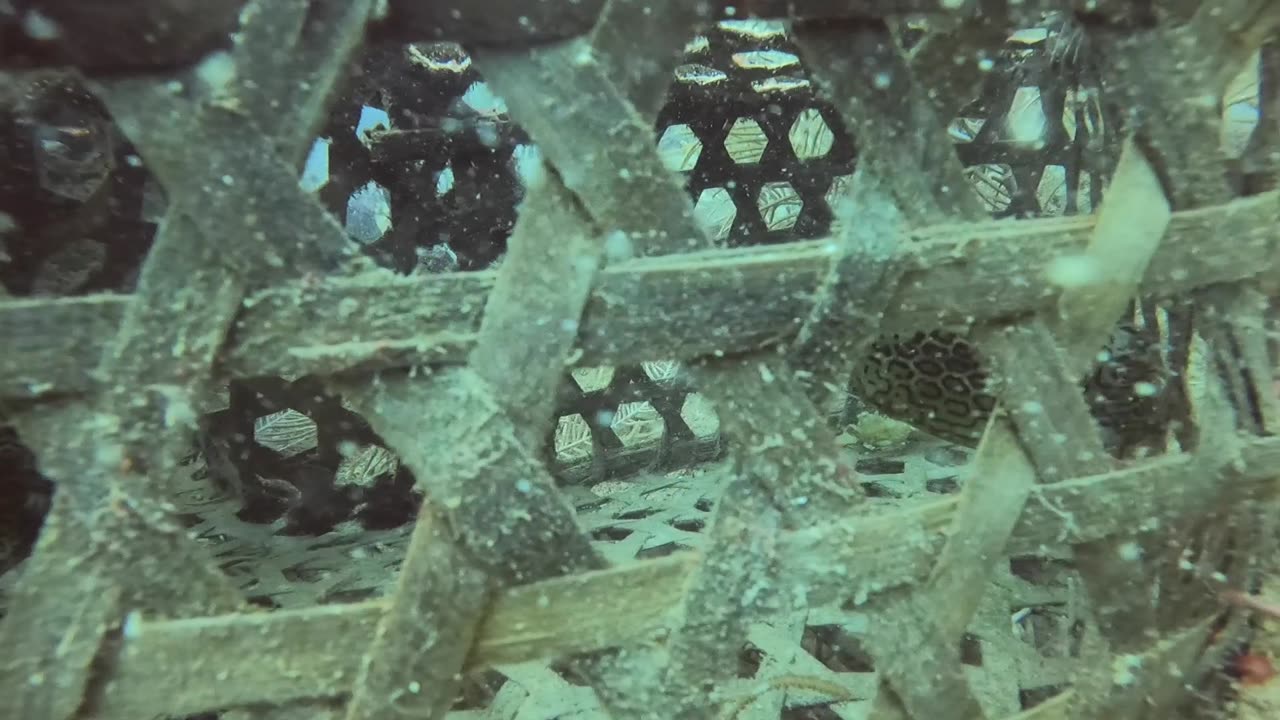Premium Only Content

Divers Free Trapped Bubble Fish From Illegal Trap
Divers that were enjoying a recreational dive near La Romana in the Dominican Republic in May 2024, came across what appeared to be an abandoned lobster trap. Being that lobster fishing in the Caribbean and Central America is experiencing a full ban between March 1 and June 30, the divers believed the reason this trap had not been recovered. This non recovery of the trap did have a negative impact locally, as it had trapped three bubble fish, they are similar to a puffer fish type of species. When the divers approached the trap, the guide had noticed that one of the divers, a man from Canada, was. Carrying a cutting divice on his buoyancy compensator. This device is used for safety in the event of a diver becoming entangled, or in this case, to help free some trapped bubble fish which surely would have died soon. Using the cutting device to cut and tear the woven reed type trap, the guide and a fellow diver soon had a large opening created in the top of the trap. This hole should have been sufficient for the trapped fish to find their way out in time. As you can see in the video, there was no other way for the trapped bubble fish to escape sure death. All creatures on the reef are important to Mother Nature. The balance is very fragile within the life on the reef. Below is a full explanation as to why the lobster fishing ban Is in effect. The article was borrowed from Casa De Campo Living, a local online news page of La Romana , Dominican Republic.
“The annual ban on lobster fishing and sales, effective from March 1 to June 30, has been reinstated across the Dominican Republic and neighbouring countries in the Caribbean and Central America. This longstanding prohibition, in force for fifteen years, extends beyond the mere harvesting of lobsters, encompassing their processing, distribution, bulk possession, and commercialization. Consequently, restaurants and tour operators are prohibited from amassing lobster supplies during this period.
The rationale behind this ban is rooted in the precarious status of Caribbean Spiny Lobsters, which face imminent threats from overfishing and illicit harvesting. With their mating season coinciding with the embargoed months, these crustaceans require an undisturbed period for repopulation, thus underscoring the imperative of the ban in safeguarding their survival. CODOPESCA, the Dominican Council of Fishing and Aquaculture, mandates strict adherence to the ban among supermarkets, restaurants, and fisheries, prohibiting lobster procurement, trade, or serving during the embargoed timeframe. Establishments are further compelled to furnish comprehensive reports on their lobster inventories within the initial ten business days of the prohibition, after which a 20-day grace period is allotted for the consumption, sale, or disposal of existing stocks, subject to verification by CODOPESCA. The ban on lobster fishing is in place to protect the lobster populations from depletion and to ensure that the lobsters available for export meet high-quality standards. Violations of the embargo carry significant penalties, including fines amounting to US$50,000 and imprisonment for up to 10 years.”
-
 LIVE
LIVE
Danny Haiphong
2 hours ago $5.03 earnedMARK SLEBODA & SCOTT RITTER: NATO ATTACKS RUSSIA, PUTIN FIRES ICBM WARNING SHOT AT UKRAINE—WW3 NEXT?
2,005 watching -
 40:47
40:47
Dave Portnoy
6 hours agoThe Unnamed Show With Dave Portnoy, Kirk Minihane, Ryan Whitney - Episode 37
34.9K1 -
 51:53
51:53
The Rubin Report
3 hours agoCrowd Shocked by Ben Affleck’s Unexpected Take on This Massive Change
70.4K42 -
 2:07:25
2:07:25
Steven Crowder
5 hours agoBREAKING: Russia Launches ICBM for First Time in History - What Happens Next?
425K204 -
 1:39:19
1:39:19
The Shannon Joy Show
6 hours ago🔥🔥While Americans Are Watching WWE Politics: Australia Is Ramping Up MANDATORY Digital ID🔥🔥
39.7K8 -
 2:03:36
2:03:36
LFA TV
16 hours agoTHE FIGHT IN ONLY BEGINNING! | LIVE FROM AMERICA 11.21.24 11am EST
59.5K26 -
 1:18:10
1:18:10
Graham Allen
6 hours agoPutin Vows Peace With Trump But WAR Under Biden!! + 400,000 Kids Are MISSING?!
127K231 -
 2:11:07
2:11:07
Matt Kohrs
14 hours agoMSTR Squeezes Higher, Bitcoin To $100k & Nvidia Post Earnings || The MK Show
63.5K1 -
 42:07
42:07
BonginoReport
8 hours agoNikki Haley's Hatred of Tulsi Gabbard Just Made Me a Bigger Fan (Ep.90) - 11/21/24
124K237 -
 28:41
28:41
Professor Nez
13 hours ago🚨BLOOD on their HANDS! The Man Biden & Kamala Flew In Finally Faces JUSTICE for Laken Riley
62K31